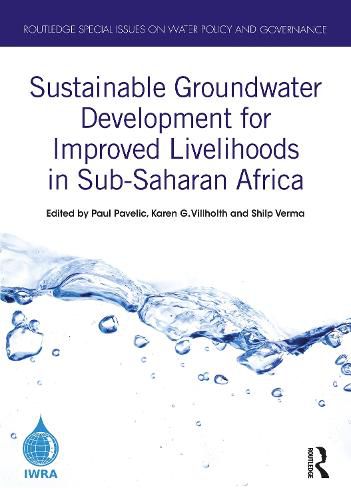Readings Newsletter
Become a Readings Member to make your shopping experience even easier.
Sign in or sign up for free!
You’re not far away from qualifying for FREE standard shipping within Australia
You’ve qualified for FREE standard shipping within Australia
The cart is loading…






This book provides a comprehensive analysis of the benefits and challenges of intensifying groundwater irrigation in Sub-Saharan Africa (SSA) for improving smallholder agrarian livelihoods. Only about 3% of the groundwater resources of Sub-Saharan Africa are used for irrigated agriculture despite the subcontinent's relative abundance of groundwater. The majority of the region's smallholders are highly dependent on seasonal dryland cropping, making them extremely vulnerable to uncertain weather patterns and droughts. Improved irrigation capabilities through sustainable groundwater development could unleash smallholder farming and make it a major driver of economic growth, poverty reduction, climate resilience, and improved food security. So, why is groundwater so underused? Tapping into groundwater requires a major shift in farming practices and it has its own challenges and requirements - smallholder access to land and finance for irrigation infrastructure and equipment, gendered and equitable adoption options. This whole list is framed in terms of what the smallholder farmers need. Hence, this should also be put in this context, supply chains, energy access, resource availability, and institutional support.
The chapters in this book present a picture that is not only heterogeneous across the region, but also hold some common denominators. They serve to enrich the discourse and help better understand the barriers along the pathways toward the sustainable and transformative adoption of groundwater irrigation. The scientific information provided herein would be of interest to researchers, practitioners, decision makers and planners with interest in the region. This book was originally published as a Special Issue of Water International journal.
$9.00 standard shipping within Australia
FREE standard shipping within Australia for orders over $100.00
Express & International shipping calculated at checkout
This book provides a comprehensive analysis of the benefits and challenges of intensifying groundwater irrigation in Sub-Saharan Africa (SSA) for improving smallholder agrarian livelihoods. Only about 3% of the groundwater resources of Sub-Saharan Africa are used for irrigated agriculture despite the subcontinent's relative abundance of groundwater. The majority of the region's smallholders are highly dependent on seasonal dryland cropping, making them extremely vulnerable to uncertain weather patterns and droughts. Improved irrigation capabilities through sustainable groundwater development could unleash smallholder farming and make it a major driver of economic growth, poverty reduction, climate resilience, and improved food security. So, why is groundwater so underused? Tapping into groundwater requires a major shift in farming practices and it has its own challenges and requirements - smallholder access to land and finance for irrigation infrastructure and equipment, gendered and equitable adoption options. This whole list is framed in terms of what the smallholder farmers need. Hence, this should also be put in this context, supply chains, energy access, resource availability, and institutional support.
The chapters in this book present a picture that is not only heterogeneous across the region, but also hold some common denominators. They serve to enrich the discourse and help better understand the barriers along the pathways toward the sustainable and transformative adoption of groundwater irrigation. The scientific information provided herein would be of interest to researchers, practitioners, decision makers and planners with interest in the region. This book was originally published as a Special Issue of Water International journal.